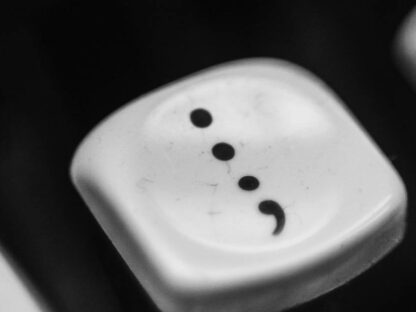Grammar
A collection of posts about issues related to grammar. Brush up on your skills and make sure you can create grammatically perfect writing with Knowadays.

What Is the Present Perfect Tense? (With Examples)
What Is the Present Perfect Tense? (With Examples)
Dec 26, 2022
The present perfect tense is one of the most common verb tenses in English, and despite the name containing the word present, it describes actions relating to both the past and present. Does it sound confusing? It doesn’t have to be! Read on for how to recognize and use the present perfect tense. How to […]

When to Use “I” and “Me” in a Sentence
When to Use “I” and “Me” in a Sentence
Nov 19, 2022
Is it “you and me” or “you and I”? This can be a complex question, even for native English speakers. The difference lies in whether you need to use a subject pronoun or an object pronoun. In this post, we’ll dig into what these pronouns are and how to establish when “I” or “me” is […]

How to Use Semicolons (With Examples)
Oct 24, 2022
A semicolon (;) is a punctuation mark that indicates a pause, and it typically serves two purposes: linking two closely related independent clauses and separating items in a multipart list. But how are they different from colons? And when is a semicolon a better choice than a comma? As a proofreader, you’ll need to know […]

The Bad Big Wolf? A Proofreader’s Guide to Adjective Order
Oct 08, 2022
If the phrases “black little dress” and “red dry wine” sound strange in your head, you have intrinsic knowledge of English adjective order. When we use multiple adjectives to modify a noun or nouns, they don’t fall into a random sequence. Rather, they follow a pattern based on their function. In fact, most native English […]

Proofreading Tips: A Guide to Countable and Uncountable Nouns
Aug 04, 2022
Common nouns can be either countable or uncountable. But what does this mean in practice? And what does a proofreader need to know about countable and uncountable nouns? In this post, we set out the basics of how these noun types work and some common errors to look out for. What Are Countable Nouns? Countable […]

Proofreading Tips: Is or Are? A Guide to Collective Nouns
Jul 20, 2022
Collective nouns are nouns that refer to a group of people or objects, including words like team, family, and crowd. But are they singular or plural? And how do you use collective nouns in a sentence? These are things you need to know as a proofreader. Read on to find out more. Collective Nouns and […]

5 Tips on How to Write the Perfect Christmas Card
Dec 18, 2021
It’s that time of year again! Christmas is just around the corner, and you’ve got a lot to do – wrapping presents, buying food, writing Christmas cards… the list goes on. It would be easy to let your proofreading standards slip! But to help you avoid this, we’ve come up with five tips on writing […]

Proofreading Tips: Cacti or Cactuses? A Guide to Irregular Plurals
Dec 11, 2021
As a proofreader (or an aspiring one), you should know not all plurals are formed by adding -s to the end of a singular noun. You’ve probably also learned some irregular plurals by heart. But are there rules you should follow here? And how do they work if so? In this post, we’ll look at […]

Proofreading Tips: Noun and Verb Spelling Differences
Proofreading Tips: Noun and Verb Spelling Differences
Nov 25, 2021
Correcting spelling mistakes is key for any proofreader. But certain errors are easy to miss! This is especially true when it comes to noun and verb spelling differences, partly because they often vary by dialect. In this post, for example, we’ll be taking a look at three cases where the noun and verb forms of […]

Proofreading Tips: Can You Start a Sentence with a Conjunction?
Proofreading Tips: Can You Start a Sentence with a Conjunction?
Nov 21, 2021
As a proofreader, you need to be able to spot and fix grammatical errors. You may have been taught that starting a sentence with a conjunction is one of these errors, but this is in fact a common grammar myth! In this post, we’ll explain what a coordinating conjunction is and why you probably don’t […]

